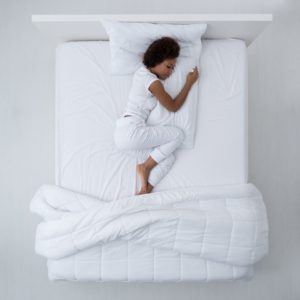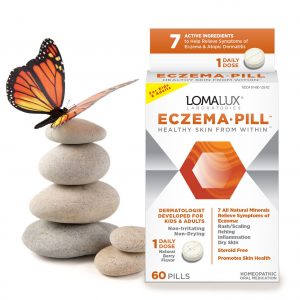Why Are Eczema & Itching Worse At Night- And What To Do About It
| 09Mar2021

About Nocturnal Eczema
Sleep promotes both physical and mental health, but people with Eczema are susceptible to sleep disruption, as Eczema prone skin is most vulnerable at night, when skin irritation, itching, and inflammation are at their worst due to your body’s internal clock which regulates the timing of all functions – called the Circadian Rhythm. This impacts both children’s and adult’s sleep cycles. In addition to sleep disturbance, some children with eczema can also suffer from restless leg syndrome, making bedtime a challenge, to say the least.
The Circadian Clock regulates all body processes, telling your cells, organs when to do what. It is located in the hypothalamus. Even your skin cells, tissues, and organ systems have their own internal clock.
At night, even normal skin’s pH level becomes more acidic, your skin is less hydrated and your skin temperature increases, causing skin dryness, causing itching, causing disrupted sleep.
Here’s some information about the Circadian Clock – and importantly, helpful information on what you can do to improve your sleep, and help relieve nocturnal eczema. Working with our biological rhythms is vital to your health.
About The Circadian Rhythm
The Circadian Clock is an internal 24-hour timing mechanism that coordinates all biochemical and physiological processes. It marks the passage of light and dark within a 24 hour period. When it is out of balance, it can undermine our health by affecting our sleep. Working with our biological rhythms keeps our bodies at optimal function.
A healthy Circadian Rhythm balances the release of cortisol in the daytime and melatonin at night. Our cortisol levels rise up to give us the adrenaline needed to wake up and start the day. At night, once our body starts to recognize that nighttime is falling, it will release melatonin to help make us drowsy for restful sleep. Our bodies produce our own melatonin, but exposure to artificial light in our homes and blue light from devices all decrease melatonin, resulting in sleep deprivation, and the lack of restful, restorative sleep that our bodies need to function properly. More research is needed, but it is theorized that eczema sufferers have a misaligned Circadian Rhythm, with more cortisol levels than melatonin in their bodies. You can check with your doctor, who will test your levels and advise as to appropriate treatment.
Even seasonal changes affect melatonin levels – as it is typically higher in fall and winter months with less daylight and then is lower during the spring and summer when there is more daylight. Melatonin tells your body when it is time to sleep, but also is an important antioxidant and anti-inflammatory. These seasonal changes in day/night and temperature are also one of the reasons eczema usually flares between season changes.
Cortisol is the opposite of melatonin, and it has other functions along with just waking us up. It is also a stress hormone. It provokes the “fight or flight” response, putting our bodies on full alert against any danger. But when cortisol is released in large amounts, it suppresses our immune system and increases the inflammation level in your body. This inflammatory response exacerbates eczema and can even wake you up at night, interrupting your sleep.

Here’s How to Support a Healthy Circadian Rhythm:
Melatonin Supplementation
Adequate melatonin levels are essential to having a healthy Circadian Rhythm, with restful sleep.
Your doctor can test your melatonin level and then advise you if supplementation is needed. Some doctors recommend taking an initial melatonin supplement 3 to 4 hours before bedtime and then a higher dose a half-hour before bedtime. Check with your doctor as to dosage and also to learn if melatonin might interact with any other drugs you are currently taking. Also, certain drugs can cause melatonin depletion, such as NSAIDs (non-steroidal anti-inflammatory drugs – pain relievers such as aspirin, ibuprofen) antidepressants, beta-blockers, and medications with estrogen.
Time-Restricted Eating
Some people have found that restricting food intake to within an 8 – 10 hour period allows the body to digest and absorb all nutrients, keeping within the body’s Circadian Rhythm.
Also, a healthy, balanced diet provides your body with the essential vitamins, minerals, and other nutrients it needs to support a healthy Circadian Rhythm.
Sleep
Restful sleep restores our bodies. Generally, most people need 7 – 9 hours of sleep nightly. While sleep plays a vital role in promoting both physical and mental health, lack of sleep can alter your immune function and negatively impact the quality of life.
It is important to adhere to a regular sleep/wake cycle to help keep your Circadian Rhythm in balance.

Exercise
Exercise is important not only for overall health but it also supports an optimal Circadian Rhythm. Cortisol rises in the morning and peaks within 30 minutes of waking. Exercising in the morning can increase cortisol output and your metabolic rate, supporting sleep, blood sugar control, metabolic and cardiovascular health.
Nature – Being Outdoors Regularly
By spending time outdoors daily, breathing in the fresh air, and being a part of nature, improves your stress levels, calms your brain, and lowers cortisol levels.
Mind-Body Practices
De-stress and lower cortisol by practicing meditation, breathing exercises, yoga, tai chi, or qi gong.
Supplementation to Reduce Cortisol
Some research suggests that some supplements might help lower your stress/cortisol level. Check with your doctor prior to supplementation, as some supplements may have drug interactions with any medications you are currently taking. Here are a few supplements you might want to check out:
- Ashwagandha
- Rhodiola
- Lemon Balm
- Chamomile
How to Improve Sleep & Manage Nocturnal Eczema
Lower Room Temperature
Lots of people become overheated while sleeping and then wake up sweating and itching. Make sure you lower the room temperature before sleeping, some people have found 60 to 65 degrees as an optimal temperature, but you might want to experiment to find the best temperature for you. Also, try using a fan to keep you cool.
Wear Non-Irritating, Soothing Pajamas, & Bedding
100% cotton fabrics, bamboo, and linen are gentle on the skin and allow the skin to breathe. Stay away from harsh fabrics, especially polyester fabrics, which retain heat. Use fragrance-free, dye-free detergents and wash clothing and bedding frequently to remove dust mites and skin debris that can aggravate the skin.
Bedtime Skincare
Take warm (never hot) baths or showers before bedtime to destress. Follow within a few minutes with a moisturizer designed for sensitive eczema-prone skin to lock in moisture. This will keep your skin well hydrated at nighttime and help avoid nocturnal eczema symptoms. Due to the Circadian Rhythm, topical skincare products are better absorbed by your skin at night, so you’ll get optimal results.
In warm weather, keep your body moisturizer in the refrigerator to soothe and cool your skin.
Relax, Chill Out Before Bedtime
Instead of watching TV or using a device, find a relaxing activity to help you relax, and wind down prior to bedtime. Soothing music or meditation are a few alternatives.
Take Loma Lux Eczema Pill at Bedtime
To combat nocturnal eczema symptoms, take Eczema Pill at bedtime to help keep itching at bay. Developed by our dermatologist founder for his own patients, it contains 7 all-natural, skin & itch clearing minerals that work internally for healthy skin from within with no chemicals, no steroids.

ECZEMA·PILL™https://lomalux.com/product/eczema-pills/
The information in this article is not meant to replace the advice of a physician.
